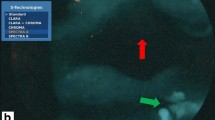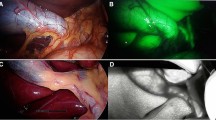Abstract
Background
Despite the standardization of laparoscopic cholecystectomy (LC), the rate of bile duct injury (BDI) has risen from 0.2 to 0.5 %. Routine use of intraoperative cholangiography (IOC) has not been widely accepted because of its cost and a lack of evidence concerning its use in preventing BDI. Fluorescent cholangiography (FC), which has recently been advocated as an alternative to IOC, is a novel intraoperative procedure involving infrared visualization of the biliary structures. This study evaluated costs and effectiveness of routinely implemented FC and IOC during LC.
Materials and methods
Between February and June 2013, the authors prospectively collected the data of all patients undergoing laparoscopic cholecystectomy. We retrospectively reviewed and compared the use of FC and IOC. Procedure time, procedure cost, and effectiveness of the two methods were analyzed and compared. The surgeons involved in the cases completed a survey on the usefulness of each method.
Results
A total of 43 patients (21 males and 22 females) were analyzed during the study period. Mean age was 49.53 ± 14.35 years and mean body mass index was 28.35 ± 8 kg/m2. Overall mean operative time was 64.95 ± 17.43 min. FC was faster than IOC (0.71 ± 0.26 vs. 7.15 ± 3.76 min; p < 0.0001). FC was successfully performed in 43 of 43 cases (100 %) and IOC in 40 of 43 cases (93.02 %). FC was less expensive than IOC (US$14.10 ± 4.31 vs. US$778.43 ± 0.40; p < 0.0001). According to the survey, all surgeons found routine use of FC useful.
Conclusion
In this study, FC was effective in delineating important anatomic structures. It required less time and expense than IOC, and was perceived by the surgeons to be easier to perform, and at least as useful as IOC. Further prospective studies are warranted to evaluate the effectiveness of FC in decreasing BDI.
Similar content being viewed by others
References
Soper NJ (2011) Cholecystectomy: from Langenbuch to natural orifice transluminal endoscopic surgery. World J Surg 7:1422–1427
Panesar SS, Salvilla SA, Patel B, Donaldson SL (2011) Laparoscopic cholecystectomy: device-related errors revealed through a national database. Expert Rev Med Devices 5:555–560
Nuzzo G, Giuliante F, Giovannini I, Ardito F, Vellone M, Murazio M et al (2005) Bile duct injury during laparoscopic cholecystectomy: results of an Italian national survey on 56,591 cholecystectomies. Arch Surg 10:986–992
Berci G, Hunter J, Morgenstern L, Arregui M, Brunt M, Carroll B et al (2013) Laparoscopic cholecystectomy: first, do no harm; second, take care of bile duct stones. Surg Endosc 27(4):1051–1054
Buddingh KT, Weersma RK, Savenije RA, van Dam GM, Nieuwenhuijs VB (2011) Lower rate of major bile duct injury and increased intraoperative management of common bile duct stones after implementation of routine intraoperative cholangiography. J Am Coll Surg 2:267–274
Strasberg SM (2002) Avoidance of biliary injury during laparoscopic cholecystectomy. J Hepatobiliary Pancreat Surg 5:543–547
De Reuver PR, Wind J, Cremers JE, Busch OR, Van Gulik TM, Gouma DJ (2008) Litigation after laparoscopic cholecystectomy: an evaluation of the Dutch arbitration system for medical malpractice. J Am Coll Surg 2:328–334
Flum DR, Flowers C, Veenstra DL (2003) A cost-effectiveness analysis of intraoperative cholangiography in the prevention of bile duct injury during laparoscopic cholecystectomy. J Am Coll Surg 3:385–393
De Reuver PR, Busch ORC, Rauws EA, Lameris JS, Van Gulik TM, Gouma DJ (2007) Long-term results of a primary end-to-end anastomosis in peroperative detected bile duct injury. J Gastrointest Surg 3:296–302
Sajid MS, Leaver C, Haider Z, Worthington T, Karanjia N, Singh KK (2012) Routine on-table cholangiography during cholecystectomy: a systematic review. Ann R Coll Surg Engl 6:375–380
Tornqvist B, Stromberg C, Persson G, Nilsson M (2012) Effect of intended intraoperative cholangiography and early detection of bile duct injury on survival after cholecystectomy: population based cohort study. BMJ 345:e6457
Ragulin-Coyne E, Witkowski ER, Chau Z, Ng SC, Santry HP, Callery MP et al (2013) Is routine intraoperative cholangiogram necessary in the twenty-first century? A national view. J Gastrointest Surg 3:434–442
Speich R, Saesseli B, Hoffmann U, Neftel KA, Reichen J (1988) Anaphylactoid reactions after indocyanine-green administration. Ann Intern Med 109(4):345–346
Alander JT, Kaartinen I, Laakso A, Pätilä T, Spillmann T, Tuchin VV et al (2012) A review of indocyanine green fluorescent imaging in surgery. International journal of biomedical imaging. Int J Biomed Imaging 2012:940585
Ishizawa T, Tamura S, Masuda K, Aoki T, Hasegawa K, Imamura H et al (2009) Intraoperative fluorescent cholangiography using indocyanine green: a biliary road map for safe surgery. J Am Coll Surg 1:1–4
Ishizawa T, Kaneko J, Inoue Y, Takemura N, Seyama Y, Aoki T et al (2011) Application of fluorescent cholangiography to single-incision laparoscopic cholecystectomy. Surg Endosc 8:2631–2636
Livingston EH, Miller JAG, Coan B, Rege RV (2007) Costs and utilization of intraoperative cholangiography. J Gastrointest Surg 9:1162–1167
Ishizawa T, Bandai Y, Ijichi M, Kaneko J, Hasegawa K, Kokudo N (2010) Fluorescent cholangiography illuminating the biliary tree during laparoscopic cholecystectomy. Br J Surg 9:1369–1377
Buddingh KT, Nieuwenhuijs VB, Van Buuren L, Hulscher JBF, De Jong JS, Van Dam GM (2011) Intraoperative assessment of biliary anatomy for prevention of bile duct injury: a review of current and future patient safety interventions. Surg Endosc 8:2449–2461
Nickkholgh A, Soltaniyekta S, Kalbasi H (2006) Routine versus selective intraoperative cholangiography during laparoscopic cholecystectomy: a survey of 2,130 patients undergoing laparoscopic cholecystectomy. Surg Endosc 6:868–874
Fletcher DR, Hobbs MS, Tan P, Valinsky LJ, Hockey RL, Pikora TJ et al (1999) Complications of cholecystectomy: risks of the laparoscopic approach and protective effects of operative cholangiography a population-based study. Ann Surg 4:449–457
Podnos YD, Gelfand DV, Dulkanchainun TS, Wilson SE, Cao S, Ji P et al (2001) Is intraoperative cholangiography during laparoscopic cholecystectomy cost effective? Am J Surg 6:663–669
Flum DR, Dellinger EP, Cheadle A, Chan L, Koepsell T (2003) Intraoperative cholangiography and risk of common bile duct injury during cholecystectomy. JAMA 13:1639–1644
Massarweh NN, Devlin A, Elrod JAB, Symons RG, Flum DR (2008) Surgeon knowledge, behavior, and opinions regarding intraoperative cholangiography. J Am Coll Surg 6:821–830
Sarli L, Costi R, Roncoroni L (2003) Intraoperative cholangiography and risk of common bile duct injury. JAMA 4:459
Pesce A, Portale TR, Minutolo V, Scilletta R, Li Destri G, Puleo S (2012) Bile duct injury during laparoscopic cholecystectomy without intraoperative cholangiography: a retrospective study on 1,100 selected patients. Dig Surg 4:310–314
Sheffield KM, Han Y, Kuo Y-F, Townsend CM, Goodwin JS, Riall TS (2012) Variation in the use of intraoperative cholangiography during cholecystectomy. J Am Coll Surg 4:668–679
Acknowledgements
This study was made possible by an educational grant from KARL STORZ Endoskope, Tuttlingen, Germany.
Disclosures
Raul Rosenthal, Fernando Dip, Domenech Asbun, Armando Rosales-Velderrain, Emanuele Lo Menzo, Conrad Simpfendorfer, and Samuel Szomstein have no conflicts of interest to disclose.
Author information
Authors and Affiliations
Corresponding author
Rights and permissions
About this article
Cite this article
Dip, F.D., Asbun, D., Rosales-Velderrain, A. et al. Cost analysis and effectiveness comparing the routine use of intraoperative fluorescent cholangiography with fluoroscopic cholangiogram in patients undergoing laparoscopic cholecystectomy. Surg Endosc 28, 1838–1843 (2014). https://doi.org/10.1007/s00464-013-3394-5
Received:
Accepted:
Published:
Issue Date:
DOI: https://doi.org/10.1007/s00464-013-3394-5




